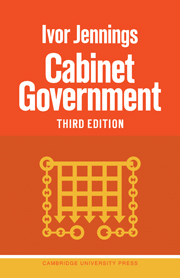Book contents
- Frontmatter
- Contents
- PREFACE
- CHAPTER I THE BRITISH CONSTITUTION
- CHAPTER II THE CHOICE OF A PRIME MINISTER
- CHAPTER III THE FORMATION OF A GOVERNMENT
- CHAPTER IV THE ADMINISTRATION
- CHAPTER V MINISTERS AT WORK
- CHAPTER VI INTER-DEPARTMENTAL RELATIONS
- CHAPTER VII TREASURY CONTROL
- CHAPTER VIII THE PRIME MINISTER
- CHAPTER IX THE CABINET
- CHAPTER X WAR AND DEFENCE
- CHAPTER XI ECONOMIC POLICY
- CHAPTER XII CONSTITUTIONAL MONARCHY
- CHAPTER XIII THE PERSONAL PREROGATIVES: DISMISSAL OF MINISTERS, DISSOLUTION OF PARLIAMENT, CREATION OF PEERS
- CHAPTER XIV PATRONAGE AND HONOURS
- CHAPTER XV GOVERNMENT AND PARLIAMENT
- APPENDIX I. GOVERNMENTS SINCE 1835
- APPENDIX II. EXAMPLES OF GOVERNMENTS
- APPENDIX III. THE PREROGATIVE OF DISSOLUTION
- APPENDIX IV. BIOGRAPHICAL AND BIBLIOGRAPHICAL NOTES
- INDEX
CHAPTER VII - TREASURY CONTROL
Published online by Cambridge University Press: 23 September 2009
- Frontmatter
- Contents
- PREFACE
- CHAPTER I THE BRITISH CONSTITUTION
- CHAPTER II THE CHOICE OF A PRIME MINISTER
- CHAPTER III THE FORMATION OF A GOVERNMENT
- CHAPTER IV THE ADMINISTRATION
- CHAPTER V MINISTERS AT WORK
- CHAPTER VI INTER-DEPARTMENTAL RELATIONS
- CHAPTER VII TREASURY CONTROL
- CHAPTER VIII THE PRIME MINISTER
- CHAPTER IX THE CABINET
- CHAPTER X WAR AND DEFENCE
- CHAPTER XI ECONOMIC POLICY
- CHAPTER XII CONSTITUTIONAL MONARCHY
- CHAPTER XIII THE PERSONAL PREROGATIVES: DISMISSAL OF MINISTERS, DISSOLUTION OF PARLIAMENT, CREATION OF PEERS
- CHAPTER XIV PATRONAGE AND HONOURS
- CHAPTER XV GOVERNMENT AND PARLIAMENT
- APPENDIX I. GOVERNMENTS SINCE 1835
- APPENDIX II. EXAMPLES OF GOVERNMENTS
- APPENDIX III. THE PREROGATIVE OF DISSOLUTION
- APPENDIX IV. BIOGRAPHICAL AND BIBLIOGRAPHICAL NOTES
- INDEX
Summary
Treasury Control of the Civil Service
It is not entirely an accident of history that the Prime Minister is also the First Lord of the Treasury. In the days when majorities were swayed by the exercise of patronage and the patronage of the Treasury was the most valuable, the principal politician was necessarily the First Lord or, to put it equally truly, the First Lord was the principal politician. Even now the Chief Whip, whose official title is ‘Parliamentary Secretary to the Treasury’ is sometimes called by his old name, which was ‘Patronage Secretary’. Though all the Treasury Ministers were technically responsible, the financial business was left to the Chancellor of the Exchequer, while the political business—the distribution of patronage and the management of Parliament—was undertaken by the First Lord with the assistance of the Patronage Secretary and the Junior Lords of the Treasury, who became the Government whips.
With the disappearance of patronage as a political weapon, the Prime Minister's responsibility for appointments to the public service and his responsibility for the management of the House of Commons became quite distinct, and the Parliamentary Secretary ceased to deal with patronage, except the minor patronage involved in the distribution of honours to Members of Parliament and their principal supporters in the constituencies. Nevertheless, it was desirable that the Treasury should retain a general control of the public service, not merely for financial reasons, but also because it was necessary to create a unified service with such departmental variations as the functions of government made necessary.
- Type
- Chapter
- Information
- Cabinet Government , pp. 144 - 172Publisher: Cambridge University PressPrint publication year: 1959



